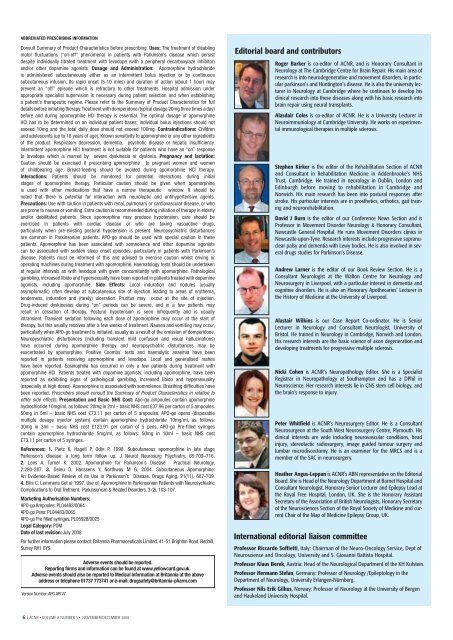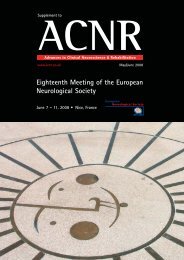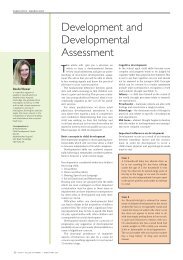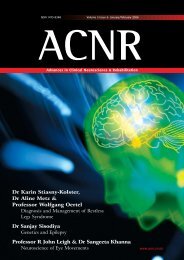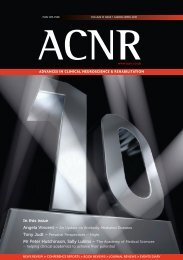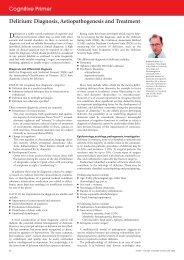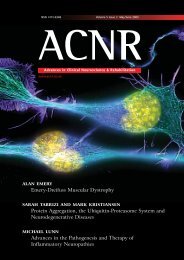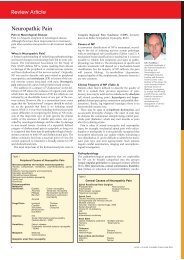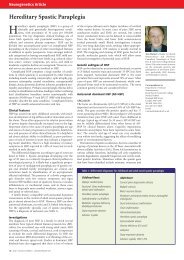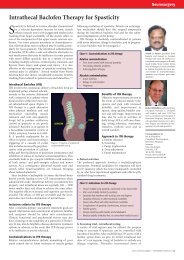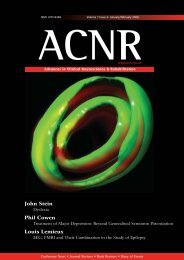Unn Ljøstad and Åse Mygland Jone Furlund Owe and Nils ... - ACNR
Unn Ljøstad and Åse Mygland Jone Furlund Owe and Nils ... - ACNR
Unn Ljøstad and Åse Mygland Jone Furlund Owe and Nils ... - ACNR
Create successful ePaper yourself
Turn your PDF publications into a flip-book with our unique Google optimized e-Paper software.
ABBREVIATED PRESCRIBING INFORMATION<br />
Consult Summary of Product Characteristics before prescribing. Uses: The treatment of disabling<br />
motor fluctuations (“on-off” phenomena) in patients with Parkinson’s disease which persist<br />
despite individually titrated treatment with levodopa (with a peripheral decarboxylaze inhibitor)<br />
<strong>and</strong>/or other dopamine agonists. Dosage <strong>and</strong> Administration: Apomorphine hydrochloride<br />
is administered subcutaneously either as an intermittent bolus injection or by continuous<br />
subcutaneous infusion. Its rapid onset (5-10 mins) <strong>and</strong> duration of action (about 1 hour) may<br />
prevent an “off” episode which is refractory to other treatments. Hospital admission under<br />
appropriate specialist supervision is necessary during patient selection <strong>and</strong> when establishing<br />
a patient’s therapeutic regime. Please refer to the Summary of Product Characteristics for full<br />
details before initiating therapy. Treatment with domperidone (typical dosage 20mg three times a day)<br />
before <strong>and</strong> during apomorphine HCl therapy is essential. The optimal dosage of apomorphine<br />
HCl has to be determined on an individual patient bases; individual bolus injections should not<br />
exceed 10mg <strong>and</strong> the total daily dose should not exceed 100mg. Contraindications: Children<br />
<strong>and</strong> adolescents (up to 18 years of age). Known sensitivity to apomorphine or any other ingredients<br />
of the product. Respiratory depression, dementia, psychotic disease or hepatic insufficiency.<br />
Intermittent apomorphine HCl treatment is not suitable for patients who have an “on” response<br />
to levodopa which is marred by severe dyskinesia or dystonia. Pregnancy <strong>and</strong> lactation:<br />
Caution should be exercised if prescribing apomorphine to pregnant women <strong>and</strong> women<br />
of childbearing age. Breast-feeding should be avoided during apomorphine HCl therapy.<br />
Interactions: Patients should be monitored for potential interactions during initial<br />
stages of apomorphine therapy. Particular caution should be given when apomorphine<br />
is used with other medications that have a narrow therapeutic window. It should be<br />
noted that there is potential for interaction with neuroleptic <strong>and</strong> antihypertensive agents.<br />
Precautions: Use with caution in patients with renal, pulmonary or cardiovascular disease, or who<br />
are prone to nausea or vomiting. Extra caution is recommended during initiation of therapy in elderly<br />
<strong>and</strong>/or debilitated patients. Since apomorphine may produce hypotension, care should be<br />
exercised in patients with cardiac disease or who are taking vasoactive drugs,<br />
particularly when pre-existing postural hypotension is present. Neuropsychiatric disturbances<br />
are common in Parkinsonian patients. APO-go should be used with special caution in these<br />
patients. Apomorphine has been associated with somnolence <strong>and</strong> other dopamine agonists<br />
can be associated with sudden sleep onset episodes, particularly in patients with Parkinson’s<br />
disease. Patients must be informed of this <strong>and</strong> advised to exercise caution whilst driving or<br />
operating machines during treatment with apomorphine. Haematology tests should be undertaken<br />
at regular intervals as with levodopa with given concomitantly with apomorphine. Pathological<br />
gambling, increased libido <strong>and</strong> hypersexuality have been reported in patients treated with dopamine<br />
agonists, including apomorphine. Side Effects: Local induration <strong>and</strong> nodules (usually<br />
asymptomatic) often develop at subcutaneous site of injection leading to areas of erythema,<br />
tenderness, induration <strong>and</strong> (rarely) ulceration. Pruritus may occur at the site of injection.<br />
Drug-induced dyskinesias during “on” periods can be severe, <strong>and</strong> in a few patients may<br />
result in cessation of therapy. Postural hypotension is seen infrequently <strong>and</strong> is usually<br />
intransient. Transient sedation following each dose of apomorphine may occur at the start of<br />
therapy, but this usually resolves after a few weeks of treatment. Nausea <strong>and</strong> vomiting may occur,<br />
particularly when APO-go treatment is initiated, usually as a result of the omission of domperidone.<br />
Neuropyschiatric disturbances (including transient mild confusion <strong>and</strong> visual hallucinations)<br />
have occurred during apomorphine therapy <strong>and</strong> neuropsychiatric disturbances may be<br />
exacerbated by apomorphine. Positive Coombs’ tests <strong>and</strong> haemolytic anaemia have been<br />
reported in patients receiving apomorphine <strong>and</strong> levodopa. Local <strong>and</strong> generalised rashes<br />
have been reported. Eosinophilia has occurred in only a few patients during treatment with<br />
apomorphine HCl. Patients treated with dopamine agonists, including apomorphine, have been<br />
reported as exhibiting signs of pathological gambling, increased libido <strong>and</strong> hypersexuality<br />
(especially at high doses). Apomorphine is associated with somnolence. Breathing difficulties have<br />
been reported. Prescribers should consult the Summary of Product Characteristics in relation to<br />
other side effects. Presentation <strong>and</strong> Basic NHS Cost: Apo-go ampoules contain apomorphine<br />
hydrochloride 10mg/ml, as follows: 20mg in 2ml – basic NHS cost £37.96 per carton of 5 ampoules.<br />
50mg in 5ml – basic NHS cost £73.11 per carton of 5 ampoules. APO-go opens (disposable<br />
multiple dosage injector system) contain apomorphine hydrochloride 10mg/ml, as follows:<br />
30mg in 3ml – basic NHS cost £123.91 per carton of 5 pens. APO-go Pre-filled syringes<br />
contain apomorphine hydrochloride 5mg/ml, as follows: 50mg in 10ml – basic NHS cost<br />
£73.11 per carton of 5 syringes.<br />
References: 1. Pietz K, Hagell P, Odin P, 1998. Subcutaneous apomorphine in late stage<br />
Parkinson’s disease: a long term follow up. J Neurol Neurosurg Psychiatry. 65:709–716.<br />
2. Lees A, Turner K, 2002. Apomorphine for Parkinson’s Disease. Practical Neurology,<br />
2:280-287. 3. Deleu D, Hanssens Y, Northway M G, 2004. Subcutaneous Apomorphine:<br />
An Evidence-Based Review of its Use in Parkinson’s Disease. Drugs Aging, 21(11), 687-709.<br />
4. Ellis C, Lemmens Get al 1997. Use of Apomorphine in Parkinsonian Patients with Neurosychiatric<br />
Complications to Oral Tretment. Parkinsonism & Related Disorders, 3 (2), 103-107.<br />
Marketing Authorisation Numbers:<br />
APO-go Ampoules: PL04483/0064<br />
APO-go Pens: PL04483/0065<br />
APO-go Pre filled syringes: PL05928/0025<br />
Legal Category: POM<br />
Date of last revision: July 2008<br />
For further information please contact: Britannia Pharmaceuticals Limited, 41-51 Brighton Road, Redhill,<br />
Surrey RH1 6YS.<br />
Adverse events should be reported.<br />
Reporting forms <strong>and</strong> information can be found at www.yellowcard.gov.uk.<br />
Adverse events should also be reported to Medical Information at Britannia at the above<br />
address or telephone 01737 773741 or e-mail: drugsafety@britannia-pharm.com<br />
Version Number: APG.API.V7<br />
Editorial board <strong>and</strong> contributors<br />
Roger Barker is co-editor of <strong>ACNR</strong>, <strong>and</strong> is Honorary Consultant in<br />
Neurology at The Cambridge Centre for Brain Repair. His main area of<br />
research is into neurodegenerative <strong>and</strong> movement disorders, in particular<br />
parkinson's <strong>and</strong> Huntington's disease. He is also the university lecturer<br />
in Neurology at Cambridge where he continues to develop his<br />
clinical research into these diseases along with his basic research into<br />
brain repair using neural transplants.<br />
Alasdair Coles is co-editor of <strong>ACNR</strong>. He is a University Lecturer in<br />
Neuroimmuniology at Cambridge University. He works on experimental<br />
immunological therapies in multiple sclerosis.<br />
Stephen Kirker is the editor of the Rehabilitation Section of <strong>ACNR</strong><br />
<strong>and</strong> Consultant in Rehabilitation Medicine in Addenbrooke's NHS<br />
Trust, Cambridge. He trained in neurology in Dublin, London <strong>and</strong><br />
Edinburgh before moving to rehabilitation in Cambridge <strong>and</strong><br />
Norwich. His main research has been into postural responses after<br />
stroke. His particular interests are in prosthetics, orthotics, gait training<br />
<strong>and</strong> neurorehabilitation.<br />
David J Burn is the editor of our Conference News Section <strong>and</strong> is<br />
Professor in Movement Disorder Neurology & Honorary Consultant,<br />
Newcastle General Hospital. He runs Movement Disorders clinics in<br />
Newcastle-upon-Tyne. Research interests include progressive supranuclear<br />
palsy <strong>and</strong> dementia with Lewy bodies. He is also involved in several<br />
drugs studies for Parkinson's Disease.<br />
Andrew Larner is the editor of our Book Review Section. He is a<br />
Consultant Neurologist at the Walton Centre for Neurology <strong>and</strong><br />
Neurosurgery in Liverpool, with a particular interest in dementia <strong>and</strong><br />
cognitive disorders. He is also an Honorary Apothecaries' Lecturer in<br />
the History of Medicine at the University of Liverpool.<br />
Alastair Wilkins is our Case Report Co-ordinator. He is Senior<br />
Lecturer in Neurology <strong>and</strong> Consultant Neurologist, University of<br />
Bristol. He trained in Neurology in Cambridge, Norwich <strong>and</strong> London.<br />
His research interests are the basic science of axon degeneration <strong>and</strong><br />
developing treatments for progressive multiple sclerosis.<br />
Nicki Cohen is <strong>ACNR</strong>’s Neuropathology Editor. She is a Specialist<br />
Registrar in Neuropathology at Southampton <strong>and</strong> has a DPhil in<br />
Neuroscience. Her research interests lie in CNS stem cell biology, <strong>and</strong><br />
the brain’s response to injury.<br />
Peter Whitfield is <strong>ACNR</strong>’s Neurosurgery Editor. He is a Consultant<br />
Neurosurgeon at the South West Neurosurgery Centre, Plymouth. His<br />
clinical interests are wide including neurovascular conditions, head<br />
injury, stereotactic radiosurgery, image guided tumour surgery <strong>and</strong><br />
lumbar microdiscectomy. He is an examiner for the MRCS <strong>and</strong> is a<br />
member of the SAC in neurosurgery.<br />
Heather Angus-Leppan is <strong>ACNR</strong>'s ABN representative on the Editorial<br />
Board. She is Head of the Neurology Department at Barnet Hospital <strong>and</strong><br />
Consultant Neurologist, Honorary Senior Lecturer <strong>and</strong> Epilepsy Lead at<br />
the Royal Free Hospital, London, UK. She is the Honorary Assistant<br />
Secretary of the Association of British Neurologists, Honorary Secretary<br />
of the Neurosciences Section of the Royal Society of Medicine <strong>and</strong> current<br />
Chair of the Map of Medicine Epilepsy Group, UK.<br />
International editorial liaison committee<br />
Professor Riccardo Soffietti, Italy: Chairman of the Neuro-Oncology Service, Dept of<br />
Neuroscience <strong>and</strong> Oncology, University <strong>and</strong> S. Giovanni Battista Hospital.<br />
Professor Klaus Berek, Austria: Head of the Neurological Department of the KH Kufstein.<br />
Professor Hermann Stefan, Germany: Professor of Neurology /Epileptology in the<br />
Department of Neurology, University Erlangen-Nürnberg.<br />
Professor <strong>Nils</strong> Erik Gilhus, Norway: Professor of Neurology at the University of Bergen<br />
<strong>and</strong> Haukel<strong>and</strong> University Hospital.<br />
6 I <strong>ACNR</strong> • VOLUME 8 NUMBER 5 • NOVEMBER/DECEMBER 2008


